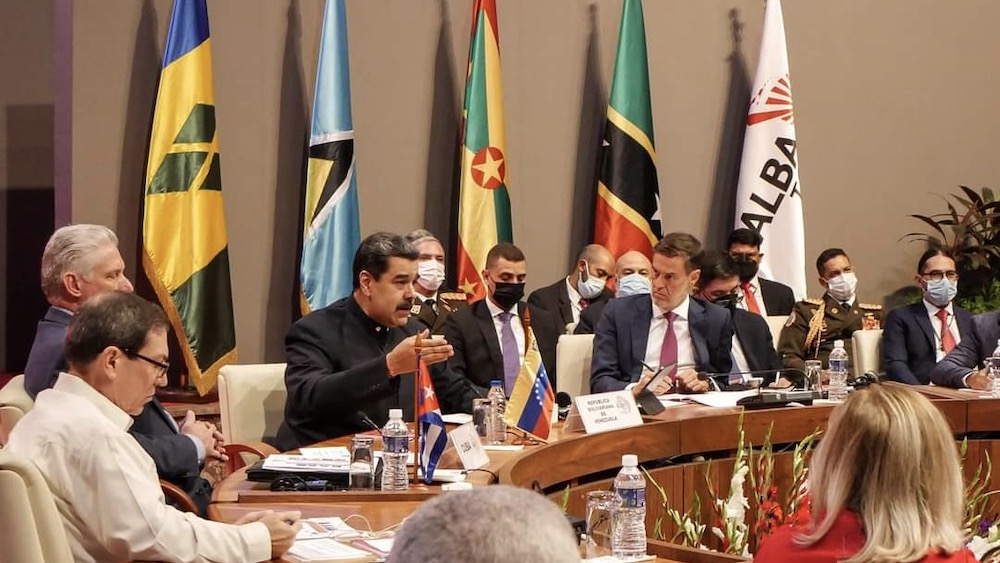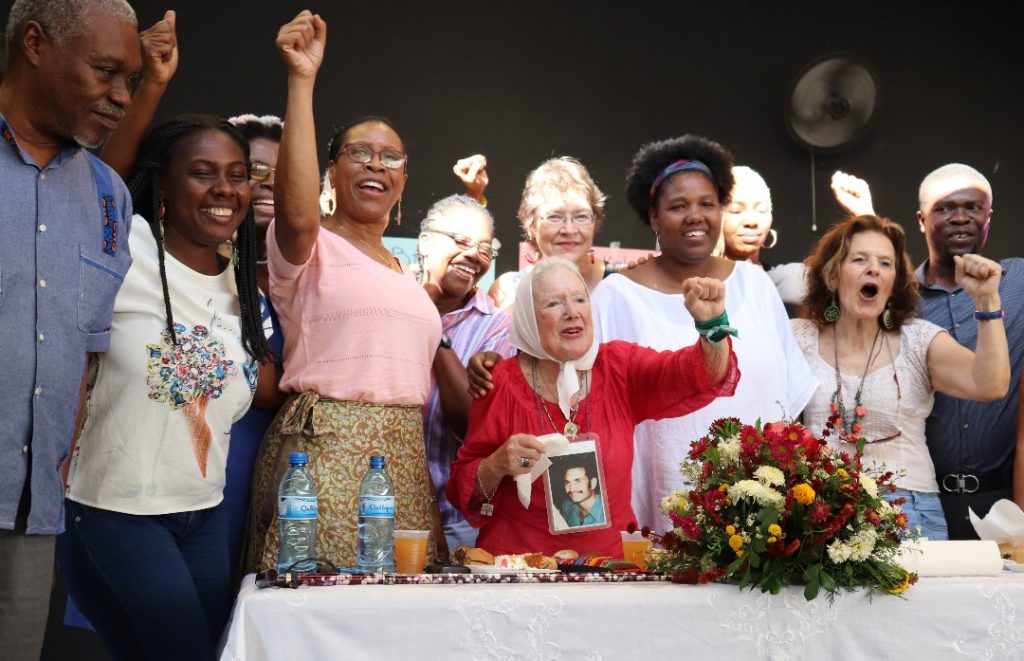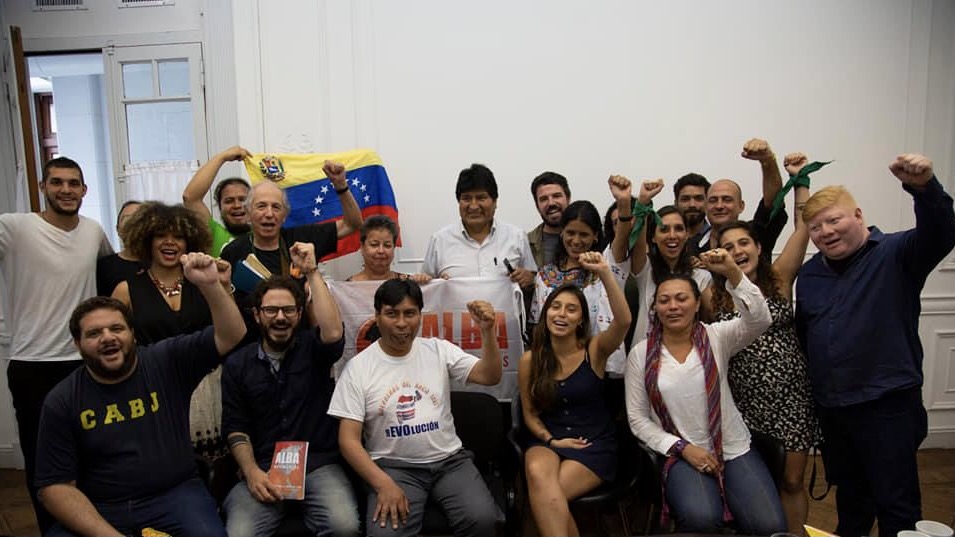Amid shifts in the regional political scenario as well as the global situation, the organizations and movements that are part of the platform ALBA Movimientos continue preparations for their third continental assembly. Over 150 delegates from people’s movements, trade unions, and left political formations from across Latin America and the Caribbean will come together in the city of Buenos Aires, Argentina for four days at the end of April to discuss the current political moment in the region as well as analyze the pressing tasks for the platform.
ALBA Movements structures the core of its work across the continent which ranges from internationalist brigades, political education, campaigns, mobilizations, and more, around six guiding principles. In this upcoming Assembly, the coordination of ALBA and the delegates at the Assembly will analyze the work carried out in the last period by the platform and the plans for the upcoming period in terms of how they promote these strategic principles.
Our America, the Great Homeland
The first of these: “Unity of Our America and Internationalism” speaks to the broader vision of the project of ALBA and makes a direct reference to the historical legacy that ALBA is a part of. The concept of “Our America,” was coined by Cuban revolutionary writer José Martí to speak to historic, economic, and cultural necessity of the peoples and nations of Latin America and the Caribbean to reject US hegemony and instead build together a common culture, identity, and economic relations based on dignity. For Martí, as well as for ALBA Movements and many progressive organizations in Latin America today, the imperialist powers at every stage of capitalism have blocked the development of the region.
Since José Martí first expressed the sentiments of revolutionaries across the region through “Our America,” many more have taken up this strategic vision and attempted to make it a reality. One of these efforts which continues today, began at the turn of the 21st century when Hugo Chávez took office and began to build, alongside Cuban leader Fidel Castro, genuine projects of political, economic, cultural, and social integration amongst the peoples and states of the region.
In that period, as the US attempted to impose its dominance on “its backyard” and promote the Free Trade Area of the Americas (FTAA), Fidel and Chávez called for the founding of Bolivarian Alliance for the Peoples of Our America – People’s Trade Treaty (ALBA-TCP) in 2004. ALBA-TCP was founded to serve as a platform for social, political and economic integration of Latin American and Caribbean nations “in defense of independence, self-determination and the identity of peoples comprising it.”
A year after ALBA-TCP was founded, Petrocaribe was established which was one of the most significant projects of building interdependence in the region and attempting to advance in the development of countries ravaged by centuries of colonialism and imperialism. The Agreement of Energy Cooperation was proposed by the Bolivarian Government of Venezuela in order to bridge the deficits in access to energy resources through a new framework based on favorable, equitable, and just exchange between the countries of the Caribbean. In practice, lower-income countries were able to buy Venezuelan oil for discounted rates alongside investments in crucial energy infrastructure, as well as social programs to help develop these often marginalized countries. This agreement reached not only countries with friendly governments, but all those who could benefit from more just oil prices. Petrocaribe later became a fundamental part of the ALBA-TCP economic cooperation.

In 2008, the Union of South American Nations (UNASUR) was founded under the leadership of Commander Hugo Chávez, at the Third Summit of Heads of State, in Brasilia, Brazil.
In 2011, the Community of Latin American and Caribbean States (CELAC) was founded by Chávez to promote regional unity and peace, political cooperation, and socio-economic development of all member countries, while respecting the political, economical, social, cultural and ideological differences of each country. It was established as a counterweight to the US-dominated Organization of American States (OAS) and has continued to grow in importance in the latest progressive wave in the region.
It is within this context that ALBA Movements itself emerged in 2013. Amid the growth of cooperation between states, many recognized the necessity of encouraging similar building of links and projects among the multitude of people’s movements in the continent who had, alongside the leaders of ALBA-TCP, been part of the heroic struggle to defeat the FTAA and were waging fierce resistance to neoliberal capitalism and imperialism in countries whose governments aligned with Washington.
This is why the the struggle to build Our America, or as Chávez in the Bolivarian tradition called “The Great Homeland” (La Patria Grande), a Latin America free of domination, that is plurinational, pluricultural, and based on solidarity and cooperation, is at the heart of ALBA Movements.
How to get there
Beyond the historic importance of the principle of “Unity of Our America and Internationalism”, the concept has practical implications and measures. In its platform, ALBA Movements lays out the strategic lines of what this means in practice.
The first aspect is the defense of revolutions. The region of Latin America and the Caribbean has been home to some of the most important revolutions in the world which have sought to resist US imperialism in its own backyard and were the primary forces in building the aforementioned projects of regional integration. In that sense, it outlines that “the defense and support of the revolutionary processes of Our America is a shared responsibility of the countries that are part of ALBA Movements”.
This includes the “active defense and support of the Bolivarian Revolution of Venezuela; the recognition and defense of the historic process of the Cuban Revolution and the demand to lift the criminal blockade, as well as return the Guantanamo base; the recognition, defense, and support to the Process of Change brought forward by the Plurinational State of Bolivia, and the continuation of the legacy of the Sandinista Revolution and the Mexican revolution.”
Continental peace is the second strategic line which ratifies the call made at the Second Summit of CELAC to declare Latin America and the Caribbean as “zones of peace” and to strengthen the struggle for demilitarization and the end of imperialist bases in the region. The commitment to accompany and support Colombia’s long struggle for peace and justice is a central point as well.
Decolonization, independence, and self-determination of the peoples is the third aspect highlighted by ALBA stating that “In the 21st century there can not be colonies in Our America”. In this sense they affirm their support for the anti-colonial struggles that the people of the region continue to wage such as for a free Puerto Rico, for the Malvinas to be given back to Argentina, and other territories annexed by imperialism.
The fourth element of building Our America is restitution and reparation of the rights of the people. This line calls for the crimes committed by US imperialism, transnational corporations, colonial powers, instruments of financial domination over centuries (and that continue today) to be judged and for reparations to be paid. It specifically points out that the unjust debt faced by Haiti be canceled and reparations be paid by the French.

The limitrophe territories, or the historically marginalized areas, are recognized as important spaces of encounter, development and political, economic, and cultural cooperation. The strengthening of relationships and building of people’s power in these areas is key to building unity and achieving Good Living for all.
ALBA, in its sixth strategic line on building Our America, supports the call for migrants’ rights and universal citizenship that came out of the Global Conference for a World without Walls towards Universal Citizenship” which took place in Bolivia in 2017 under the leadership of Evo Morales and the Plurinational State of Bolivia. “We stand in solidarity with those who have been obliged to migrate as a consequence of the policies of spoliation of capitalism, rejecting all forms of xenophobia and racism that covers up slavery and material exploitation,” the conference statement said.
Pedagogy of internationalism is the element which grounds the work done by the platform to create links of solidarity across the region and the world, and builds a sense of collective struggle. Internationalism as an ethic and practice of movements in ALBA is a priority. This is fostered through exchange of lessons of struggles, systematizing internationalist experiences in recent history, building international solidarity campaigns, and more.





